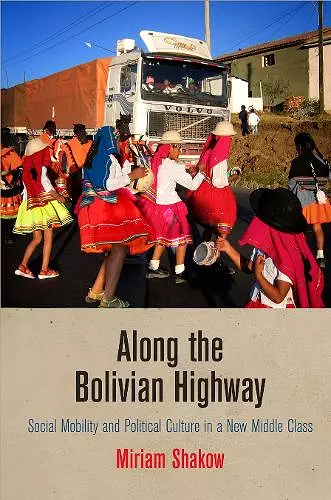Along the Bolivian Highway
Social Mobility and Political Culture in a New Middle Class
Format:Hardback
Publisher:University of Pennsylvania Press
Published:26th May '14
Currently unavailable, and unfortunately no date known when it will be back

This book narrates the unexpected dilemmas middle-class Bolivians have faced following the coming to power of a left-wing, indigenous movement. Shakow argues that new middle classes in Bolivia, as elsewhere in the Third World, constitute a significant force that profoundly shapes politics and social life.
Along the Bolivian Highway traces the emergence of a new middle class in Bolivia, a society commonly portrayed as the site of struggle between a superwealthy white minority and a destitute indigenous majority. Miriam Shakow shows how Bolivian middle classes have deeply shaped politics and social life. While national political leaders like Evo Morales have proclaimed a new era of indigenous power and state-led capitalism in place of racial exclusion and neoliberal free trade, Bolivians of indigenous descent who aspire to upward mobility have debated whether to try to rise within their country's longstanding hierarchies of race and class or to break down those hierarchies. The ascent of indigenous politics, and a boom in coca and cocaine production beginning in the 1970s, have created dilemmas for "middling" Bolivians who do not fit the prevailing social binaries of white elite and indigenous poor. In their family relationships, political activism, and community life, the new middle class confronted competing moral imperatives.
Focusing on social and political struggles that hinged on class and racial status in a provincial boomtown in central Bolivia, Shakow recounts the experiences of first-generation teachers, agronomists, lawyers, and prosperous merchants. They puzzled over whom to marry, how to claim public interest in the face of accusations of selfishness, and whether to seek political patronage jobs amid high unemployment. By linking the intimate politics within families to regional and national power struggles, Along the Bolivian Highway sheds light on what it means to be middle class in the global south.
"Shakow has produced a fascinating and beautifully written ethnography that explores the question: 'What might postneoliberalism look like?' In her portrayal of upwardly mobile urban indigenous Bolivians, out go polarized constructions of the social categories class and ethnicity. Instead we see an indigenous middle class dynamically shaped by effects of the coca boom, free-market government reforms, and different interpretations of Evo Morales's state socialism. Shakow shows us the work world of this heterogeneous labor force and their debates about social transformation, clientelism, and commitments to new sorts of collective action. This is a pathbreaking, theoretically sophisticated ethnography that is an exciting, very accessible read." * Kay Warren, Brown University *
"This detailed and insightful ethnography focuses on the ambiguities and complexities of race, class, and political-economic transformation in the Bolivian middle classes, which are often ignored in studies of power and resistance." * Bret Gustafson, Washington University in St. Louis *
"Along the Bolivian Highway draws upon rich ethnographic research to document changes in class and other civic sensibilities across a dramatic period of change in contemporary Bolivian society." * Andrew Orta, University of Illinois-Urbana-Champaign *
ISBN: 9780812246148
Dimensions: unknown
Weight: unknown
272 pages